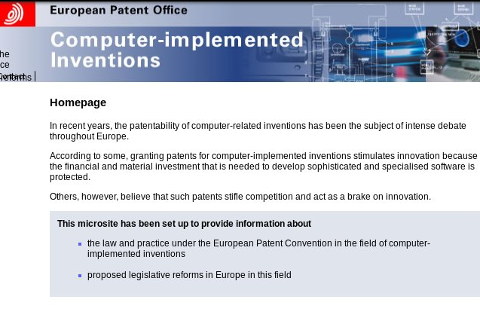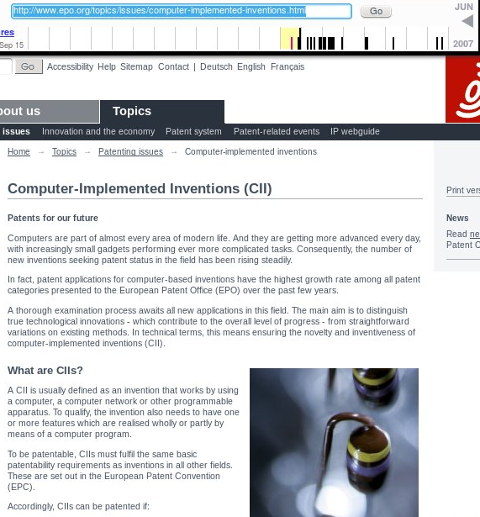


BOTH the European Patent Office (EPO) and the U.S. Patent and Trademark Office (USPTO) nowadays exploit the "AI" hype wave (it seems as though the EPO started it). More recently UN/WIPO joined 'the club'. I've been programming so-called 'AI' since I was a teenager; I put AI in scare quotes because it's a catchphrase, an abstraction. Many things can (and do) get called "AI" even if they involve a little bit of statistics and mostly boil down to "if" and "else" statements (decisions made based on atomic criteria). It's about classification somewhere in the code and it is always about algorithms. The EPO hopes to work around the EPC and the USPTO tries to circumvent 35 U.S.C. ۤ 101/Alice (SCOTUS).
"Many things can (and do) get called "AI" even if they involve a little bit of statistics and mostly boil down to "if" and "else" statements (decisions made based on atomic criteria)."We have written a great deal about this subject already; it goes years back and it started under Battistelli, whose friends at Managing IP have just published this piece, "AI and patents," (part of a series) in which they promote "AI" as means for generating patent applications while at the same time promoting patents on the underlying methods. "Patent Strategy’s landmark survey of more than 60 in-house lawyers shows that most businesses believe artificial intelligence will be used for invention discovery," they wrote yesterday, "but that patenting those products and processes could be difficult" (but possible).
What this whole "poll" boils down to is lobbying, the business model of the site (just check who the funding sources/persons are, not to mention the target audience).
It's no secret that courts would likely reject all these 'AI' patents; these simply correspond to something very abstract. There's also plenty of prior art, sans the buzzwords.
"It's no secret that courts would likely reject all these 'AI' patents; these simply correspond to something very abstract."Kritika Bharadwaj, James Donoian, and Susan Goldsmith of McCarter & English, LLP say this week (also yesterday) that "[t]he UK’s participation in the unitary patent system and Unified Patent Court are, however, open questions." No, you cannot participate in something that does not exist.
Bypassing British courts that deny patents on algorithms may seem attractive to McCarter & English, but the effects would be devastating to British software firms.
"Bypassing British courts that deny patents on algorithms may seem attractive to McCarter & English, but the effects would be devastating to British software firms."Law firms in Europe are eager to pursue (for clients) all sorts of bogus patents in violation of the EPC -- a subject we'll expand on in our next post because it's part of a disturbing pattern. As we pointed out some days ago, the EPO is now hooking up with patent extremists to promote software patents in Europe, this time under the guise of "AI inventions" (the EPO likes to say "AIPatents). In fact, retweeted by the EPO on Monday (they wrote almost nothing else) was this tweet that says: "@4ipcouncil and @EPOorg publish paper on examination of CII and AI inventions: #epo #artificialintelligence #ai #cii - http://bit.ly/2E0JOK9"
They even admit it themselves: "AI" is just "CII" (i.e. software patents). The EPO is actively collaborating/participating in this. While tweets may not necessity be endorsements, the EPO is officially involved here.
"It's an exercise in rebranding."Found via this tweet was also this new post from Microsoft's LinkedIn. It speaks of Microsoft's "AI" patents and says "Luxembourg as a country is an interesting case for patent filings. The small country managed to work its way into the top 25 jurisdictions for AI filings. Most of the filings come from American, German, Japanese and French patent ownership."
This whole post is about buzzwords like "IP" and "AI" (the title is "Quick IP Data Insight: Luxembourg AI, Powered by NVIDIA.") and it's about the most infamous tax evasion apparatus (e.g. by patent accounting tricks). This one is in Europe and again it's piggybacking the "AI" buzzword, which basically corresponds to software patents. As we recently noted, various law firms with their 'studies' nowadays try to pass off old patents as "AI", in order to pretend there's some sort of astronomical growth in such patents. It's an exercise in rebranding. ⬆